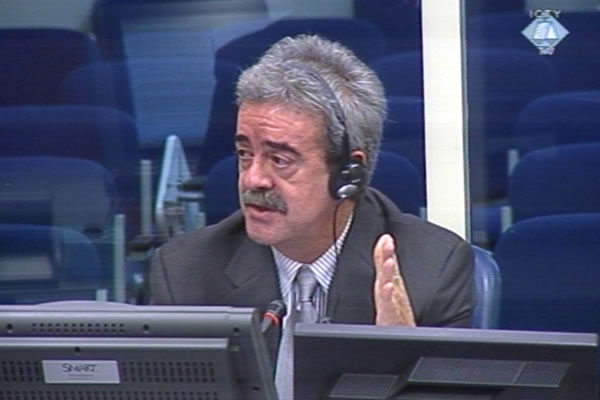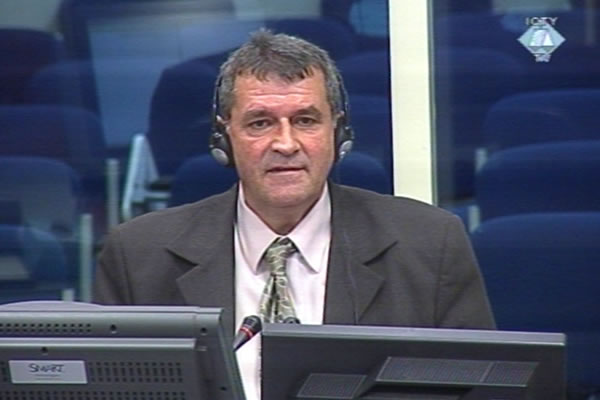Home
PRESIDENT DEFENDING PRESIDENT
In his testimony in Radovan Karadzic’s defense, former Montenegrin president and FRY prime minister Momir Bulatovic has claimed that no one was expelled during the war in BH. According to Bulatovic, there were just ‘regular’ movements of the people. Such movements occur every 50 years because of the ‘collective mentality of the people’, who decide that they should move to the territory controlled by their own ethnic community
 Momir Bulatovic, defence witness of Radovan Karadzic
Momir Bulatovic, defence witness of Radovan Karadzic In his statement to Radovan Karadzic’s defense, former Montenegrin president and FRY prime minister Momir Bulatovic said that the movements of civilians during the war in BH were not a consequence of the policies pursued by the leaderships of the various ethnic communities. These movements were a result of the ‘collective mentality of the people’ and a natural consequence of ‘civil war’. In other words, in fear for their personal safety, everyone fled to the territory controlled by their ethnic community. This, in Bulatovic’s opinion, could not have been prevented.
Bulatovic sees Karadzic as a dedicated peacemaker who tried hard to prevent the shelling of Sarajevo. General Ratko Mladic and other military commanders told Karadzic it was not possible as it would allow the BH Army to break out from the city; this would endanger Serb civilians. In his statement, Bulatovic notes that Karadzic wanted to get rid of the paramilitary formations in the VRS-controlled territory, but that was not easy. The accused ‘was surprised’ when he heard in August 1992 that civilians suffered abuse in the prison camps run by the Bosnian Serb military and police, Bulatovic argued. Karadzic told him he had obtained guarantees that civilians would be treated humanely in the future. In a bid to further exculpate the former Republika Srpska president, the witness said that in 1994 Karadzic had a conflict with General Mladic and subsequently ‘lost control’ over Mladic and the army.
In the cross-examination, prosecutor Uertz-Retzlaff reminded the witness that in his book, Rules of Keeping Silent, and in an interview for the BBC, he portrayed Karadzic as a threat to peace rather than as a peacemaker. In his book and in the interview, Bulatovic claimed that the Belgrade leadership headed by Slobodan Milosevic had tried to convince the Bosnian Serbs to agree to the peace accords but they, led by Karadzic, refused stubbornly until the Dayton peace agreement. Bulatovic also claimed that Karadzic’s leadership endangered the peace process with ‘stupid moves’ such as the attack on Gorazde in 1994. Today, however, Bulatovic argued that he ‘couldn’t tell who was in the right at the time’: he and Milosevic, when they sought an urgent end to the war, ‘anxious’ because of the sanctions imposed on Serbia, or Karadzic, who refused to do it.
Asked if he thought that the ‘collective mentality of the people’ resulted in them expelling the members of other ethnic communities in contravention of their leaders’ orders, Bulatovic said that crimes always happened in wars throughout history. In BH, people end up being expelled from their homes ‘every 50 years’ and nobody can prevent it, Bulatovic explained. Bulatovic will continue his second testimony before the Tribunal tomorrow. Bulatovic has already testified at the Kosovo Six trial.
Before Bulatovic began his evidence, the defense called two other witnesses this morning. Novica Andric and Bozidar Trisic were both former Bosnian Serb army soldiers from Rogatica and Vlasenica respectively. Andric and Trisic denied that any crimes were committed against the non-Serbs in Eastern Bosnia. According to them, the Republika Srpska army and police were not involved in any crimes. Andric contested the allegation in the indictment that the members of the Hurko family were beaten in his garage in the village of Kosovo in the Rogatica area. Andric claimed that Sefik Hurko ‘gave false testimony’ as a prosecution witness, and that the witness’s father, Miodrag Andric, was acquitted by the Cantonal Court in Sarajevo of that crime. It was revealed in the cross-examination that Andric wasn’t charged with the abuse of the victims in the garage but was tried for the murder of three Muslims. Prosecutor Zec reminded the court that Slavko Perkovic, one of the persons involved in the beatings in Andric’s garage, pleaded guilty to this crime in a BH court. The witness was adamant that there was no abuse and that Sefik Hurko lied.
On 16 May 1992, Bozidar Trisic was in the village of Zaklopaca near Vlasenica. At least 60 of his Muslim neighbors were killed there that day. In his statement to the defense, Trisic claimed that the crime was committed by ‘unknown soldiers’, not local Serbs, particularly not the soldiers and police officers from Vlasenica. Prosecutor File showed him a statement one of the witnesses gave to an investigative judge in Tuzla; in the statement, the man claims that Trisic saved his life and the lives of other Muslims who were with their Serb neighbors that day at a barbeque. Also, the prosecutor reminded the court of the statements made by Muslim survivors who claimed that they saw a local police officer, Milomir Milosevic, at the crime scene. The witness confirmed that he saved his friends’ lives but didn’t want to confirm whether officer Milosevic was involved in the crime.
Photos
Linked Reports
- Case : Karadzic
- 2013-02-27 ‘IMPLAUSIBLE’ AND ‘LESS IMPLAUSIBLE’ SREBRENICA ALLEGATIONS
- 2013-02-26 A WITNESS FOR ALL SEASONS
- 2013-02-26 KARADZIC’S MOTION FOR SUBPOENA TO FIKRET ABDIC DENIED
- 2013-03-01 MOMIR BULATOVIC AND ‘TIME OF MADMEN’
- 2013-03-01 DIFFERENCES BETWEEN RECEPTION CENTER AND PRISON
- 2013-03-04 NEUTRAL BUT ON SERB SIDE

